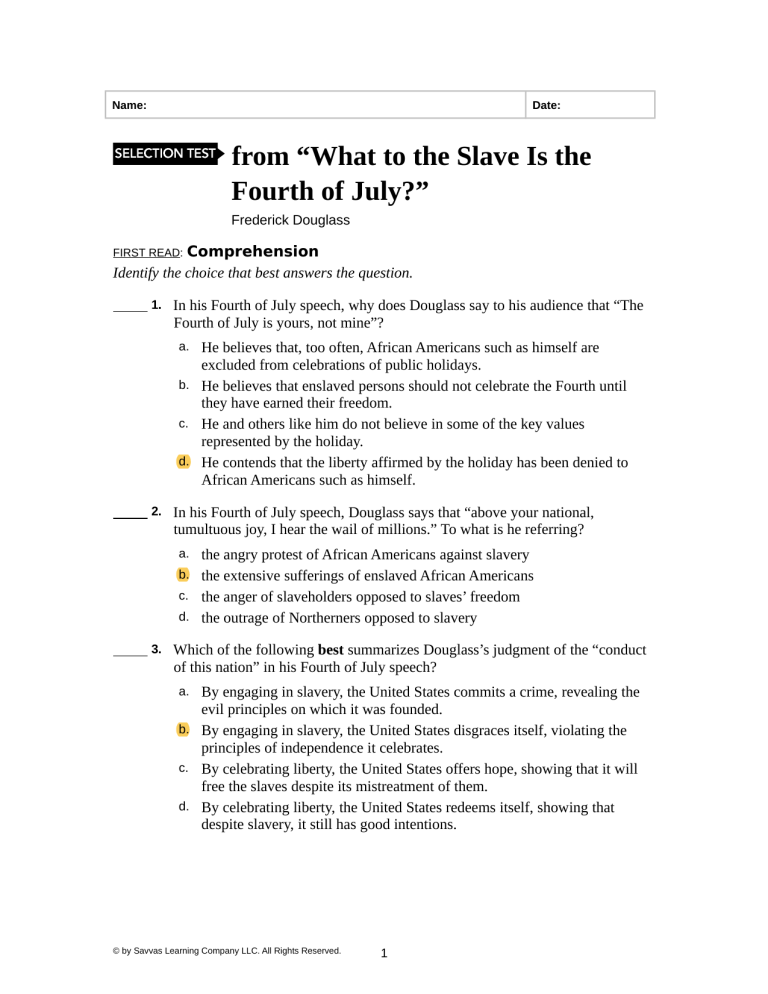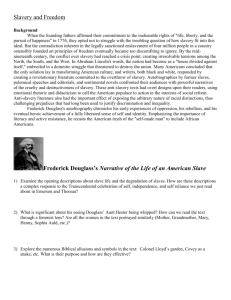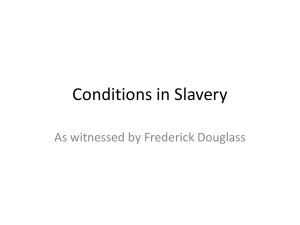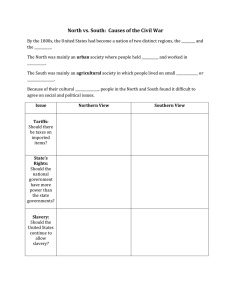
Name: Date: from “What to the Slave Is the Fourth of July?” Frederick Douglass Comprehension Identify the choice that best answers the question. FIRST READ: 1. In his Fourth of July speech, why does Douglass say to his audience that “The Fourth of July is yours, not mine”? He believes that, too often, African Americans such as himself are excluded from celebrations of public holidays. b. He believes that enslaved persons should not celebrate the Fourth until they have earned their freedom. c. He and others like him do not believe in some of the key values represented by the holiday. d. He contends that the liberty affirmed by the holiday has been denied to African Americans such as himself. a. 2. In his Fourth of July speech, Douglass says that “above your national, tumultuous joy, I hear the wail of millions.” To what is he referring? the angry protest of African Americans against slavery b. the extensive sufferings of enslaved African Americans c. the anger of slaveholders opposed to slaves’ freedom d. the outrage of Northerners opposed to slavery a. 3. Which of the following best summarizes Douglass’s judgment of the “conduct of this nation” in his Fourth of July speech? By engaging in slavery, the United States commits a crime, revealing the evil principles on which it was founded. b. By engaging in slavery, the United States disgraces itself, violating the principles of independence it celebrates. c. By celebrating liberty, the United States offers hope, showing that it will free the slaves despite its mistreatment of them. d. By celebrating liberty, the United States redeems itself, showing that despite slavery, it still has good intentions. a. © by Savvas Learning Company LLC. All Rights Reserved. 1 GRADE 11 • UNIT 3 • SELECTION TEST “WHAT TO THE SLAVE IS THE FOURTH OF JULY?” BY FREDERICK DOUGLASS Name: Date: Concept Vocabulary Identify the choice that best answers the question. FIRST READ: 4. A synonym is a word that means nearly the same as another word. Which of the following words are synonyms of stolid? Choose three options. a. b. c. d. e. f. g. 5. unemotional unfriendly expressionless unexcitable frightened unpleasant narrow-minded In which of the following situations has a person most clearly conceded something? Choose based on your knowledge of the meaning of conceded. Tomas told the team that he was taking a break from practice. b. Sid finally accepted the truth and logic of Sara’s argument. c. Mikela let Miguel go ahead of her in line at the cafeteria. d. Ramon and Taylor agreed to a debate on a controversial topic. a. 6. If there is a disparity between Mia’s grades this year and her grades last year, which of the following must be true? Mia’s grades this year are the same as they were last year. b. Mia’s grades this year are worse than they were last year. c. Mia’s grades this year are better than they were last year. d. Mia’s grades this year are different than they were last year. a. 7. Which of the following is the best definition of denounce? punish severely criticize harshly c. announce loudly d. reason clearly a. b. © by Savvas Learning Company LLC. All Rights Reserved. 2 GRADE 11 • UNIT 3 • SELECTION TEST “WHAT TO THE SLAVE IS THE FOURTH OF JULY?” BY FREDERICK DOUGLASS Name: Date: Analyze the Text Identify the choice that best answers the question. CLOSE READ: 8. The following question has two parts. Answer Part A first, and then Part B. Part A In his Fourth of July speech, Douglass asks, “Must I undertake to prove that the slave is a man?” Why does he reject the idea that he must give this proof? He believes that if anyone should prove or disprove this claim, it is the slaveholders. b. He believes that the nation refuses to see the contradictions between its ideals and the practice of slavery. c. He believes that the rights of enslaved people are clearly supported by the Bible and the Constitution. d. He believes that even those who support slavery already admit that slaves are people. a. Part B In which quotation from the speech does Douglass offer evidence to support his point in Part A? To drag a man in fetters into the grand illuminated temple of liberty, and call upon him to join you in joyous anthems, were inhuman mockery and sacrilegious irony. b. … I will, in the name of the constitution and the Bible which are disregarded and trampled upon, dare to call in question and to denounce … everything that serves to perpetuate slavery.… c. The manhood of the slave is conceded. It is admitted in the fact that Southern statute books are covered with enactments forbidding … the teaching of the slave to read or to write. d. … [A]m I to argue that it is wrong to make men brutes, to rob them of their liberty, to work them without wages, to keep them ignorant of their relations to their fellow men … ? a. © by Savvas Learning Company LLC. All Rights Reserved. 3 GRADE 11 • UNIT 3 • SELECTION TEST “WHAT TO THE SLAVE IS THE FOURTH OF JULY?” BY FREDERICK DOUGLASS Name: Date: 9. The following question has two parts. Answer Part A first, and then Part B. Part A In his Fourth of July speech, Douglass imagines someone in the audience who believes he should “argue” and “persuade” more and criticize less in order to serve his cause more effectively. Which answer choice best summarizes Douglass’s response to this individual? He adjusts his language and his argument and decides to speak more persuasively. b. He claims that the reasons to oppose slavery are so obvious that no argument is needed. c. He states that slaveholders are too stubborn to be persuaded by his arguments. d. He claims that the Declaration of Independence and the Bible present the best arguments against slavery. a. Part B Which passage from the speech best supports the answer to Part A? … and yet not one word shall escape me that any man … who is not at heart a slaveholder, shall not confess to be right and just. b. To drag a man in fetters into the grand illuminated temple of liberty … were inhuman mockery.… c. But, I submit, where all is plain, there is nothing to be argued. d. … I will, in the name of the constitution and the Bible … dare to call in question and to denounce … everything that serves to perpetuate slavery. … a. © by Savvas Learning Company LLC. All Rights Reserved. 4 GRADE 11 • UNIT 3 • SELECTION TEST “WHAT TO THE SLAVE IS THE FOURTH OF JULY?” BY FREDERICK DOUGLASS Name: 10. Date: The following question has two parts. Answer Part A first, and then Part B. Part A Read the following quotation from Douglass’s Fourth of July speech. There is not a nation on the earth guilty of practices more shocking and bloody than are the people of these United States, at this very hour. … [However,] I do not despair … “The arm of the Lord is not shortened,” and the doom of slavery is certain. I, therefore, leave off where I began, with hope. While drawing encouragement from “the Declaration of Independence,” the great principles it contains, and the genius of American Institutions, my spirit is also cheered by the obvious tendencies of the age. Which answer choice best summarizes the view of the future expressed in the quotation? Slavery will end because slaveholders cannot afford to fight their opponents. b. Slavery will end because slaveholders will be punished due to their violations of religious principles. c. Slavery will eventually come to an end due to public awareness of its gruesome practices. d. Slavery will eventually come to an end due to the nation’s principles and the antislavery movement. a. Part B Which section of the passage best supports the answer to Part A? [D]rawing encouragement from “the Declaration of Independence,” … [and] American Institutions, my spirit is also cheered by the obvious tendencies of the age. b. There is not a nation on the earth guilty of practices more shocking and bloody than are the people of these United States, at this very hour. … [However,] I do not despair …. c. “The arm of the Lord is not shortened,” and the doom of slavery is certain. d. I, therefore, leave off where I began, with hope. a. © by Savvas Learning Company LLC. All Rights Reserved. 5 GRADE 11 • UNIT 3 • SELECTION TEST “WHAT TO THE SLAVE IS THE FOURTH OF JULY?” BY FREDERICK DOUGLASS Name: Date: Analyze Craft and Structure Identify the choice that best answers the question. CLOSE READ: 11. The following question has two parts. Answer Part A first, and then Part B. Part A Which of the following is a main or central claim that Douglass argues in his Fourth of July speech? Slavery is an evil that causes great suffering. b. Slavery is an evil that causes him to become outraged. c. Slavery is an evil that goes against American values. d. Slavery is an evil that is doomed to end in the near future. a. Part B In which quotation from the speech does Douglass most clearly present the claim identified in Part A? I am not included within the pale of glorious anniversary! Your high independence only reveals the immeasurable distance between us. b. Fellow-citizens, above your national, tumultuous joy, I hear the mournful wail of millions! whose chains, heavy and grievous yesterday, are, today, rendered more intolerable by the jubilee shouts that reach them. c. … I will, … in the name of liberty which is fettered, in the name of the constitution and the Bible which are disregarded and trampled upon, dare to call in question and to denounce … everything that serves to perpetuate slavery.… d. … I would, to-day, pour out a fiery stream of biting ridicule, blasting reproach, withering sarcasm, and stern rebuke. a. © by Savvas Learning Company LLC. All Rights Reserved. 6 GRADE 11 • UNIT 3 • SELECTION TEST “WHAT TO THE SLAVE IS THE FOURTH OF JULY?” BY FREDERICK DOUGLASS Name: 12. Date: The following question has two parts. Answer Part A first, and then Part B. Part A What is the main way in which Douglass supports his argument in his Fourth of July speech? He lists various arguments made in defense of slavery, showing each to be without merit, even ridiculous. b. He offers conclusive proof that enslaved persons are legally entitled to equal rights, based on the Declaration of Independence. c. He shows that enslaved persons feel excluded on the Fourth of July, despite a natural desire to belong. d. He provides detailed evidence of the suffering that enslaved persons endure under slavery, despite their rights. a. Part B In what way does the strategy identified in Part A help Douglass to effectively achieve his purpose? He helps listeners understand the realities of slavery, focusing on its brutality and evil, so that they will adopt his point of view. b. He helps listeners consider the claims of enslaved persons to equal rights, evaluating the strength of the claim, so that they will take action. c. He elicits sympathy for enslaved persons from listeners, ensuring that their reaction will lead them to take action. d. He helps listeners see the contradiction in thinking of enslaved persons as property, leading listeners to adopt his point of view. a. © by Savvas Learning Company LLC. All Rights Reserved. 7 GRADE 11 • UNIT 3 • SELECTION TEST “WHAT TO THE SLAVE IS THE FOURTH OF JULY?” BY FREDERICK DOUGLASS Name: Date: 13. In which of the following quotations from Douglass’s Fourth of July speech does Douglass offer evidence to support his claim that enslaved persons are human beings, not brutes? To drag a man in fetters into the grand illuminated temple of liberty, and call upon him to join you in joyous anthems, were inhuman mockery and sacrilegious irony. b. Is it not astonishing that, while we are ploughing, planting, and reaping, using all kinds of mechanical tools, erecting houses, constructing bridges … and looking hopefully for life and immortality beyond the grave, we are called upon to prove that we are men! c. What, am I to argue that it is wrong to make men brutes, to rob them of their liberty, to work them without wages, to keep them ignorant of their relations to their fellow men, … to starve them into obedience and submission to their masters? d. To [the slave], your celebration [of the Fourth of July] is a sham; your boasted liberty, an unholy license; your national greatness, swelling vanity; your sounds of rejoicing are empty and heartless; … your shouts of liberty and equality, hollow mockery.… a. 14. The following question has two parts. Answer Part A first, and then Part B. Part A Which of the following is a counterclaim addressed by Douglass in his Fourth of July speech? The Fourth of July “belongs to” the free. b. Slavery is clearly an inexcusable practice. c. Slavery was established by religious law. d. The Fourth of July is a holiday doomed to end. a. Part B Which quotation from the speech gives Douglass’s response to the counterclaim identified in Part A? I am not included within the pale of glorious anniversary! Your high independence only reveals the immeasurable distance between us. b. That which is inhuman, cannot be divine! Who can reason on such a proposition? They that can, may; I cannot. The time for such argument is passed. c. There is not a nation on the earth guilty of practices more shocking and bloody than are the people of these United States, at this very hour. d. There are forces in operation which must inevitably work the downfall of slavery. “The arm of the Lord is not shortened,” and the doom of slavery is certain. a. © by Savvas Learning Company LLC. All Rights Reserved. 8


